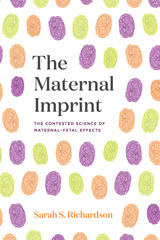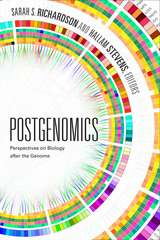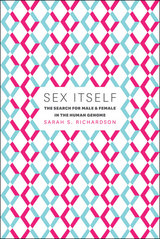3 books about Richardson, Sarah S.

The Maternal Imprint
The Contested Science of Maternal-Fetal Effects
Sarah S. Richardson
University of Chicago Press, 2021
Leading gender and science scholar Sarah S. Richardson charts the untold history of the idea that a woman's health and behavior during pregnancy can have long-term effects on her descendants' health and welfare.
The idea that a woman may leave a biological trace on her gestating offspring has long been a commonplace folk intuition and a matter of scientific intrigue, but the form of that idea has changed dramatically over time. Beginning with the advent of modern genetics at the turn of the twentieth century, biomedical scientists dismissed any notion that a mother—except in cases of extreme deprivation or injury—could alter her offspring’s traits. Consensus asserted that a child’s fate was set by a combination of its genes and post-birth upbringing.
Over the last fifty years, however, this consensus was dismantled, and today, research on the intrauterine environment and its effects on the fetus is emerging as a robust program of study in medicine, public health, psychology, evolutionary biology, and genomics. Collectively, these sciences argue that a woman’s experiences, behaviors, and physiology can have life-altering effects on offspring development.
Tracing a genealogy of ideas about heredity and maternal-fetal effects, this book offers a critical analysis of conceptual and ethical issues—in particular, the staggering implications for maternal well-being and reproductive autonomy—provoked by the striking rise of epigenetics and fetal origins science in postgenomic biology today.
The idea that a woman may leave a biological trace on her gestating offspring has long been a commonplace folk intuition and a matter of scientific intrigue, but the form of that idea has changed dramatically over time. Beginning with the advent of modern genetics at the turn of the twentieth century, biomedical scientists dismissed any notion that a mother—except in cases of extreme deprivation or injury—could alter her offspring’s traits. Consensus asserted that a child’s fate was set by a combination of its genes and post-birth upbringing.
Over the last fifty years, however, this consensus was dismantled, and today, research on the intrauterine environment and its effects on the fetus is emerging as a robust program of study in medicine, public health, psychology, evolutionary biology, and genomics. Collectively, these sciences argue that a woman’s experiences, behaviors, and physiology can have life-altering effects on offspring development.
Tracing a genealogy of ideas about heredity and maternal-fetal effects, this book offers a critical analysis of conceptual and ethical issues—in particular, the staggering implications for maternal well-being and reproductive autonomy—provoked by the striking rise of epigenetics and fetal origins science in postgenomic biology today.
[more]

Postgenomics
Perspectives on Biology after the Genome
Sarah S. Richardson and Hallam Stevens, editors
Duke University Press, 2015
Ten years after the Human Genome Project’s completion the life sciences stand in a moment of uncertainty, transition, and contestation. The postgenomic era has seen rapid shifts in research methodology, funding, scientific labor, and disciplinary structures. Postgenomics is transforming our understanding of disease and health, our environment, and the categories of race, class, and gender. At the same time, the gene retains its centrality and power in biological and popular discourse. The contributors to Postgenomics analyze these ruptures and continuities and place them in historical, social, and political context. Postgenomics, they argue, forces a rethinking of the genome itself, and opens new territory for conversations between the social sciences, humanities, and life sciences.
Contributors. Russ Altman, Rachel A. Ankeny, Catherine Bliss, John Dupré, Michael Fortun, Evelyn Fox Keller, Sabina Leonelli, Adrian Mackenzie, Margot Moinester, Aaron Panofsky, Sarah S. Richardson, Sara Shostak, Hallam Stevens
Contributors. Russ Altman, Rachel A. Ankeny, Catherine Bliss, John Dupré, Michael Fortun, Evelyn Fox Keller, Sabina Leonelli, Adrian Mackenzie, Margot Moinester, Aaron Panofsky, Sarah S. Richardson, Sara Shostak, Hallam Stevens
[more]

Sex Itself
The Search for Male and Female in the Human Genome
Sarah S. Richardson
University of Chicago Press, 2013
Human genomes are 99.9 percent identical—with one prominent exception. Instead of a matching pair of X chromosomes, men carry a single X, coupled with a tiny chromosome called the Y. Tracking the emergence of a new and distinctive way of thinking about sex represented by the unalterable, simple, and visually compelling binary of the X and Y chromosomes, Sex Itself examines the interaction between cultural gender norms and genetic theories of sex from the beginning of the twentieth century to the present, postgenomic age.
Using methods from history, philosophy, and gender studies of science, Sarah S. Richardson uncovers how gender has helped to shape the research practices, questions asked, theories and models, and descriptive language used in sex chromosome research. From the earliest theories of chromosomal sex determination, to the mid-century hypothesis of the aggressive XYY supermale, to the debate about Y chromosome degeneration, to the recent claim that male and female genomes are more different than those of humans and chimpanzees, Richardson shows how cultural gender conceptions influence the genetic science of sex.
Richardson shows how sexual science of the past continues to resonate, in ways both subtle and explicit, in contemporary research on the genetics of sex and gender. With the completion of the Human Genome Project, genes and chromosomes are moving to the center of the biology of sex. Sex Itself offers a compelling argument for the importance of ongoing critical dialogue on how cultural conceptions of gender operate within the science of sex.
[more]
READERS
Browse our collection.
PUBLISHERS
See BiblioVault's publisher services.
STUDENT SERVICES
Files for college accessibility offices.
UChicago Accessibility Resources
home | accessibility | search | about | contact us
BiblioVault ® 2001 - 2024
The University of Chicago Press









